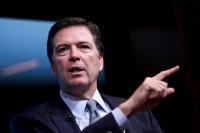-
“Great British Firewall”: U.K. plans firewall to protect industries, consumers
The GCHQ, U.K.’s surveillance agency, said it was planning to build a British firewall to offer protection against malicious hackers. GCHQ has developed cybersecurity systems the aim of which is to protect government sites and critical infrastructure, but the agency is now ready to offer its expertise to major private companies. “It’s possible to filter unwanted content or spam. It’s possible to filter offensive content. It’s technically possible to block malicious content,” GCHQ director said. “So, the question is: why aren’t we, the cybersecurity community, using this more widely? Well, we — in the U.K.— now are.”
-
-
Setting up a decoy network to help deflect a hacker's hits
Computer networks may never float like a butterfly, but information scientists suggest that creating nimble networks that can sense jabs from hackers could help deflect the stinging blows of those attacks. The researchers created a computer defense system that senses possible malicious probes of the network and then redirects that attack to a virtual network that offers little information about the real network.
-
-
Fitness trackers found to have serious security flaws

They may look like a normal watch but are capable to do much more than just showing the time: So-called fitness trackers are collecting data on their users’ lifestyle and health status on a large scale helping them with training or losing weight. Researchers have investigated fraud opportunities with fitness trackers and detected serious security flaws.
-
-
New chip to bring highest level of encryption to mobile devices
Random number generators are crucial to the encryption that protects our privacy and security when engaging in digital transactions such as buying products online or withdrawing cash from an ATM. For the first time, engineers have developed a fast random number generator based on a quantum mechanical process that could deliver the world’s most secure encryption keys in a package tiny enough to use in a mobile device.
-
-
World’s largest regional security group turns to Israel in fight against cyber terror
The Organization for Security and Cooperation in Europe (OSCE), an umbrella body for fifty-seven European, North American, and Central Asian nations in the security field, has chosen an Israeli professor to plan and establish a new teaching and research framework concerning online terror. “Online incitement, radicalization, and recruitment have had a significant impact on the recent waves of terror around the world,” Prof. Gabi Weimann, the author of Terrorism in Cyberspace, said. “This has raised awareness of the importance of research and academic knowledge in this field.”
-
-
Unbreakable encrypted messages a step closer
Until now, unbreakable encrypted messages were transmitted via a system envisioned by American mathematician Claude Shannon, considered the “father of information theory.” Shannon combined his knowledge of algebra and electrical circuitry to come up with a binary system of transmitting messages that are secure, under three conditions: the key is random, used only once, and is at least as long as the message itself. Researchers have now moved beyond the theoretical in demonstrating that an unbreakable encrypted message can be sent with a key that is far shorter than the message — the first time that has ever been done.
-
-
Strengthening national security by improving intelligence software
An intelligence analyst hunting for answers in a sea of data faces steep challenges: She must choose the right search terms, identify useful results, and organize them in a way that reveals new connections. Making that process quicker and more intuitive could yield faster answers to key national security questions. Researchers are developing intelligence software that allows analysts to interact more closely with their data.
-
-
Tackling rumors during crises
The proliferation of rumors during a crisis can hinder efforts by emergency personnel trying to establish facts. That is why a doctoral student at BGU’s Department of Emergency Medicine has developed a methodology for tracking rumors and guidelines for how to control them.
-
-
White Nationalist groups growing much faster than ISIS on Twitter

The number of White Nationalists and self-identified Nazi sympathizers on Twiter had multiplied more than 600 percent in the last four years — outpacing ISIS in all social media aspects, from the number of follower counts to the number of daily tweets, a new study found. The study’s author notes that ISIS has gained a reputation for effectively using Twitter for propaganda and recruitment, but that White Nationalist groups have excelled even more in exploiting the medium. The report says that unlike the campaign Twitter has been conducting against ISIS, White Nationalists are continuing to use the service with “relative impunity.”
-
-
Vulnerabilities found in cars connected to smartphones
Many of today’s automobiles leave the factory with secret passengers: prototype software features that are disabled but that can be unlocked by clever drivers. In what is believed to be the first comprehensive security analysis of its kind, a team of researchers has found vulnerabilities in MirrorLink, a system of rules that allow vehicles to communicate with smartphones.
-
-
FBI director calls for “adult conversation” on encryption – and the privacy-security balance

James Comey, the FBI director, has again said that end-to-end encryption on digital devices makes it impossible for his agency to investigate crimes and acts of terrorism— and called for an “adult conversation” with the manufacturers of these devices. Widespread encryption built into smartphones was “making more and more of the room that we are charged to investigate dark,” Comey said at a cybersecurity symposium.
-
-
Researchers demonstrate how data can be stolen from isolated “air-gapped” computers
Air-gapped computers are isolated — separated both logically and physically from public networks — ostensibly to prevent their being hacked over the Internet or within company networks. Researchers at the Ben-Gurion University of the Negev (BGU) have demonstrated that an unmodified USB connected to a computer with malicious code can be used to steal data from infected and even “air-gapped” computers.
-
-
A chip that checks for sabotage, flags defects
With the outsourcing of microchip design and fabrication a worldwide, $350 billion business, bad actors along the supply chain have many opportunities to install malicious circuitry in chips. These Trojan horses look harmless but can allow attackers to sabotage healthcare devices; public infrastructure; and financial, military, or government electronics. Researchers are developing a unique solution: a chip with both an embedded module that proves that its calculations are correct and an external module that validates the first module’s proofs.
-
-
Israeli tech company’s spyware turns UAE activist’s iPhone into a self-tracking device
Two University of Toronto researchers have uncovered an iPhone-based attack on Ahmed Mansoor, a prominent United Arab Emirates human rights defender. The attack employed spyware produced by NSO Group — an Israeli technology company founded by former members of Unit 8200, the Israeli military’s electronic surveillance branch – which is sold to government for the purpose of spying on their citizens.
-
-
Vulnerabilities found in iPhone, iPad operating system
An international team of computer science researchers has identified serious security vulnerabilities in the iOS — the operating system used in Apple’s iPhone and iPad devices. The vulnerabilities make a variety of attacks possible. The researchers focused on the iOS’s “sandbox,” which serves as the interface between applications and the iOS. The iOS sandbox uses a set “profile” for every third-party app. This profile controls the information that the app has access to and governs which actions the app can execute.
-
More headlines
The long view
Researchers Develop AI Agent That Solves Cybersecurity Challenges Autonomously
New framework called EnIGMA demonstrates improved performance in automated vulnerability detection using interactive tools.
